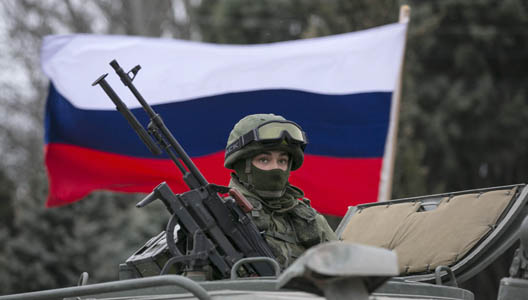 Two weeks after Russian forces began seizing control of Crimea, the daily news from there suggests that Vladimir Putin has won a virtually uncontested victory in his mission to re-absorb former lands of Russia’s empires. Russian troops in Crimea steadily have taken military posts and facilities where Ukrainians refused to surrender their loyalty to the government in Kyiv.
Two weeks after Russian forces began seizing control of Crimea, the daily news from there suggests that Vladimir Putin has won a virtually uncontested victory in his mission to re-absorb former lands of Russia’s empires. Russian troops in Crimea steadily have taken military posts and facilities where Ukrainians refused to surrender their loyalty to the government in Kyiv.
A lot of comment here in Washington focuses on weaknesses in America’s posture that may have invited Putin’s aggression and, thus, a defeat for the West. And indeed, the clouds of a strategic defeat hang in the air. But they hang much lower and darker in Moscow than in Washington.
|
We have seen too often the illusory “victory” of quick military seizures that decayed into long, costly and strategic defeat or stalemate. Many such deceptive victories in recent decades have been Russian – in the 1979 occupation of Afghanistan, and the twin Chechnya offensives of the 1990s. Six years after Putin occupied the Georgian territories of South Ossetia and Abkhazia, he still holds them with troops and barbed wire, but cannot claim to have secured their future for Moscow.
Now Putin aims to absorb Crimea, a land more than twice as large, with six times the population of the Georgian territories, and the inconvenient demographic of large Ukrainian and Tatar minorities. As bad as the moment of illusory victory is for Ukraine and the West, it is the Kremlin that is staring down the loaded gun barrel of what comes next.
The reasons are explained well by Paul Goble, the longtime US scholar and author on Eurasian ethnic histories and politics, in a blog post he’s let the Atlantic Council republish. Here are some key points:
- “By invading Ukraine, Putin has guaranteed the rise of a far more anti-Russian state there than anyone could have imagined only a few weeks ago,” plus the inevitable evolution “of other anti-Russian states around Russia’s perimeter.” Putin has illustrated dramatically that “in his world, Russia’s neighbors must be its clients and subordinates, not free [and] independent countries.”
- Putin’s invasion on behalf of ethnic Russians abroad will inevitably raise tensions in other Russian-neighbor states between their majority populations and their Russian minorities. From the Baltics to Kazakhstan, this will accelerate “Russian flight and the increasing ethnic homogenization” of those countries, which “will reduce Moscow’s ‘soft power’ influence.”
- Putin’s demonstration that Russian ethnicity trumps citizenship will resonate within Russia as well, deepening the sense of second-class citizenship felt by many non-Russians, who, overall, “now form at least a quarter of the population (and not the fifth that Putin and his people claim.” The Crimea invasion will strengthen the arguments of people (such as ethnic Chechens and Dagestanis) “who argue that they and their territories have no future in the Russian Federation.”
- Even those Russians who take seriously the notion of a federation, rather than Putin’s idea of a centralized, Moscow-dominated state, will ask why “Putin is concerned about the ethnic autonomy of Russians in Crimea” but not in Siberia or other regions with aspirations to a greater say in their government.
These elements of Russia’s defeat are not, alas, the building blocks of victory for a Ukraine or a transatlantic community that seek stability and democratization in Eastern Europe. Asked tonight at an Atlantic Council forum about the possibility of war – including an extension of Chechen-style jihadism to Crimea– interim Ukrainian Prime Minister Arseniy Yatsenyuk pursed his lips unhappily. “That’s what we want to avoid,” he said. “We need to do everything we can…to avoid bloodshed, because if it starts, there will be no end.”
James Rupert is managing editor at the Atlantic Council.
Image: A soldier mans the machine gun of a Russian army vehicle outside a Ukrainian security post in the Crimean port of Balaclava, as an unseen supporter of Moscow’s takeover waves the Russian tricolor, March 1, 2014. REUTERS/Baz Ratner
